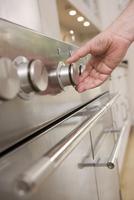Sadly, virtually everything has a shelf life, with some items expiring much sooner than expected. From that new fifty-two inch HDTV, to your once-dependable little car sitting in the driveway. Sometimes, items (especially electronics) are  beyond repair; in this case, they should be properly disposed of or preferably, recycled. However, in some situations, an item may just need a replacement part costing a couple bucks. One class of items that poses the question of whether to repair or replace is that of appliances.
beyond repair; in this case, they should be properly disposed of or preferably, recycled. However, in some situations, an item may just need a replacement part costing a couple bucks. One class of items that poses the question of whether to repair or replace is that of appliances.
Every appliance, from that sleek new GE refrigerator with an LCD screen and smart controls, to the simple that simple KitchenAid stand mixer that has been around long enough to provide mashed potatoes at seven Thanksgiving suppers, will eventually endure “wear and tear.” If for some reason, an older appliance (such as the stand mixer mentioned previously) suddenly gives out, then it may simply be time for a new one. Eight to ten years is a decent run for older appliances and sometimes repairing them will require more time and effort then you can give. However, some people grow quite partial to an appliance, especially if it is high end. If this is the case then, by all means, repair it as it may be worth it to you in the long run.

Now a general rule of thumb is to replace any appliance in which repairing would cost more than half of the original cost. For example, if you paid $300.00 for a new dishwasher and it suddenly broke down, the repairs should cost less than $150.00. However, this “rule” is not set and stone and if you are fond of, say, that dishwasher mentioned previously, then it is entirely up to you how much you are willing to pay to make repairs on it. Obviously, just like with cars, you should never go after repairs that cost more than the object is worth as it is not economically feasible.
A broken appliance is never a good thing, especially if it is used daily in an area that receives some of the heaviest traffic in the household—the kitchen. Nonetheless, it does happen, and whether you want replace or repair said appliance is entirely up to you. You may simply need a replacement gasket to get an appliance back in good working order, or sometimes, you may simply just need to replace it. Bear in mind, a broken appliance be used as an excuse for a little kitchen renovation, meaning newer appliances.
© 2011 Andrew Brusnahan

